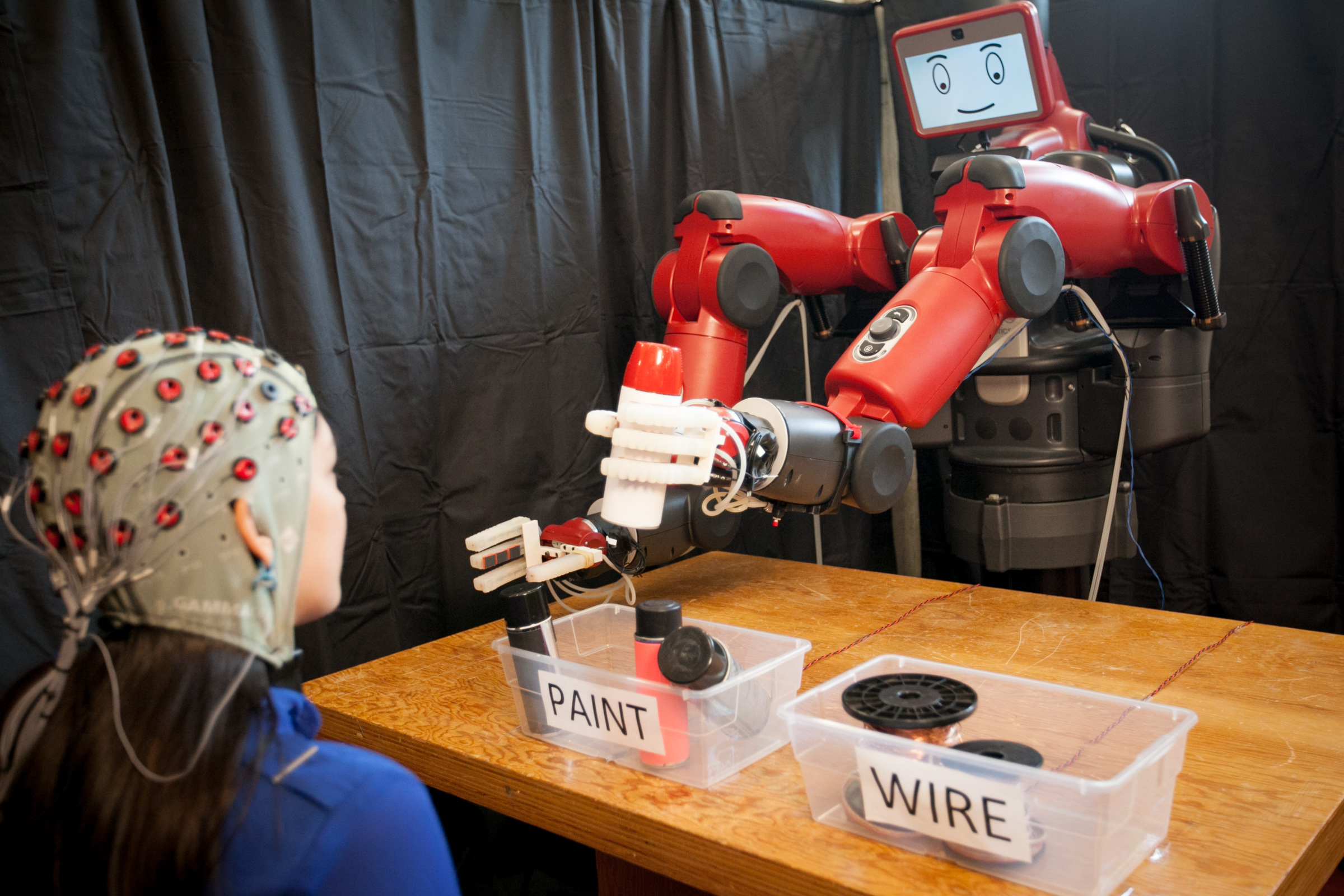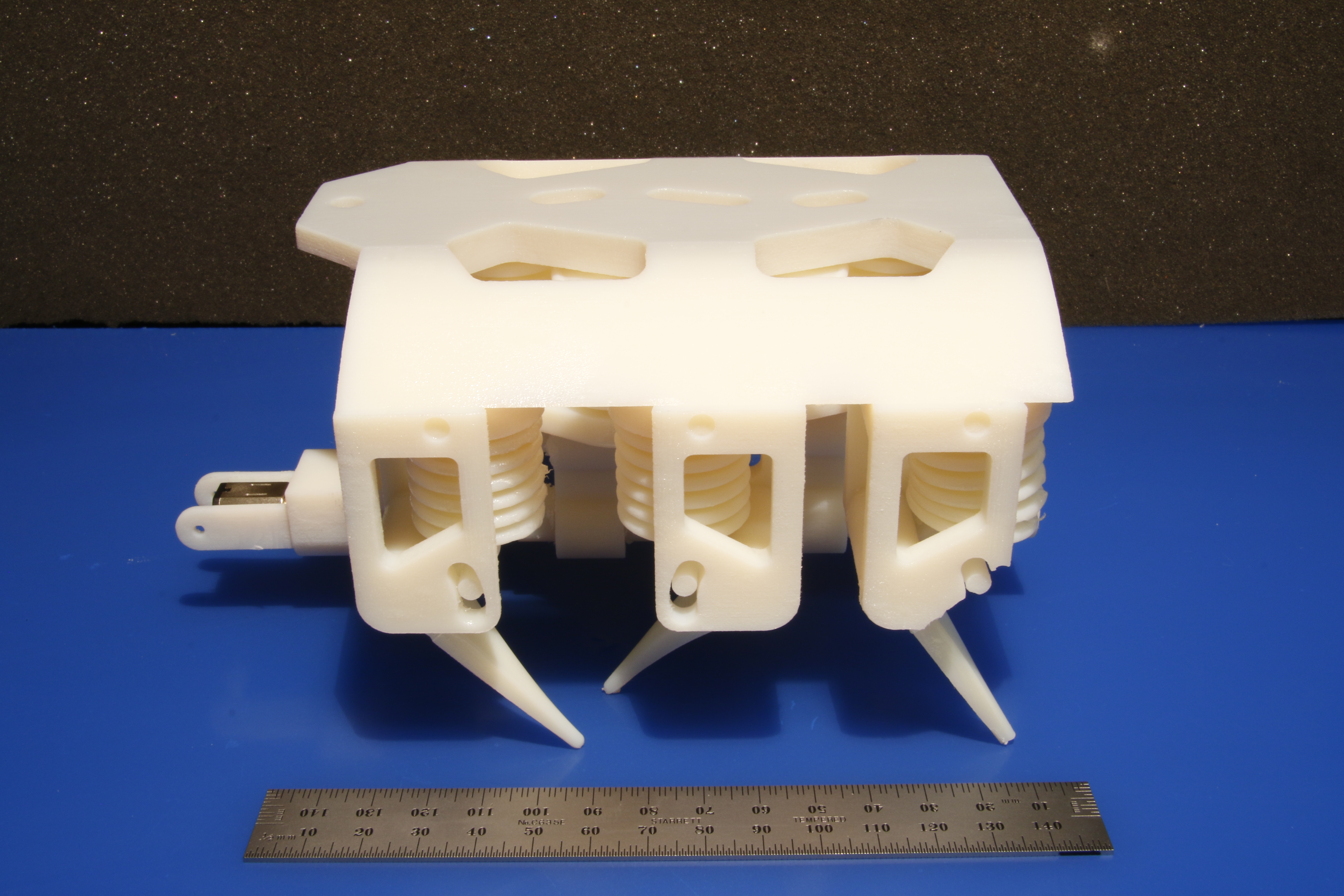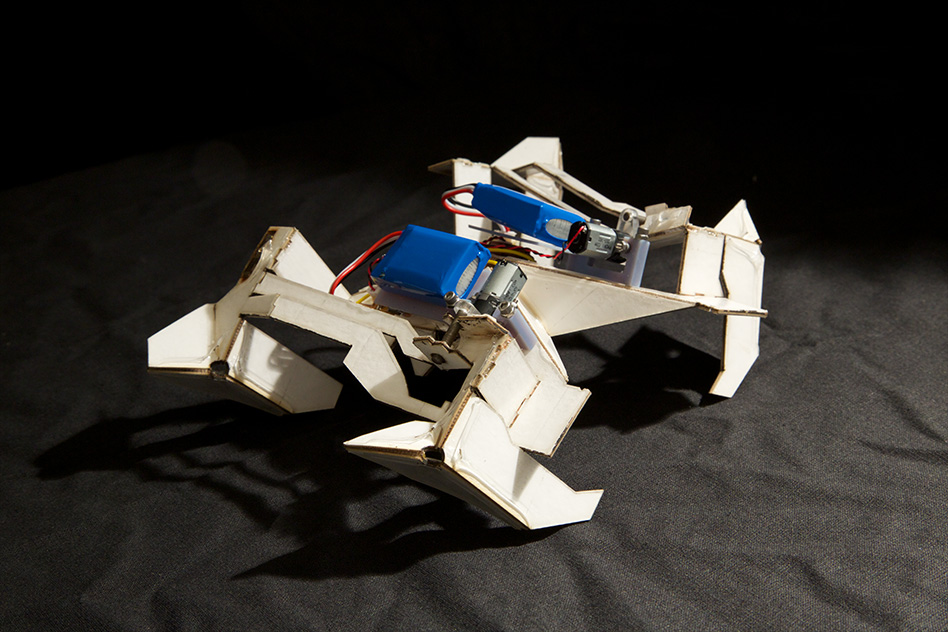Daniela Rus’s morning is packed. My arrival appears to come as a bit of a surprise, as she readies herself to enter the gauntlet of wall-to-wall meetings. She considers the situation for a moment before inviting me into her office, where a group of students are already patiently waiting to talk self-driving cars. “You can’t report about any of the findings,” Rus says with a smile. “But you can come in.”
Rus has allowed me to sit in for a packed morning of team meetings. It’s a generous gesture, but more to the point, it’s the only way to manage some face-to-face time with the head of MIT’s groundbreaking Computer Science and Artificial Intelligence Library (otherwise known as CSAIL). It’s a non-stop job, heading up the largest lab on MIT’s Cambridge, Massachusetts campus and, from the looks of it, Rus never rests. “There’s no time for an interview,” she explains, as we settle into the meeting. “Maybe during lunch.”
Inside the office, a half-dozen students are seated in a circle around a coffee table. There’s an award of some kind and an upside-down, 3D-printed robot with six legs standing up straight in the air — though both have mostly disappeared beneath piles of paperwork. A nearby bookshelf is filled with titles about electrical engineering and coding and robotics — the usual fare for a computer science professor. Near the top, however, there’s a copy of The Art of War turned on its side, sandwiching a book of JFK quotations and a Gary Shteyngart novel.
Various groups of students cycle in and out of the office over the next couple of hours. It’s a morning of problem solving, as Rus checks in on the status of a wide range of ongoing projects, from robotics to self-driving wheelchairs. She tackles every imaginable angle of the research, from coding complications, to methods for promoting CSAIL among the student body, to where the best location is in Boston for testing an autonomous boat.
She extols the virtues of both complicated theorems and common sense. “We need a robot,” she tells one of the teams. “We need a handsome, happy robot.”
I attempt to make myself scarce — an impossible task in such a small group. As I quietly peck away at my keyboard in an awkward attempt to take notes, Rus regularly points out which parts of the meeting are on- and off-the-record. “You can talk about the problems,” Rus says, slightly modifying her earlier sentiment, “but not the solutions.”
The right problem

The solutions, after all, have yet to appear in print. That’s the end goal of so many of these conversations: the acknowledgement among peers that comes with the publication of an academic paper. But in Rus’s role, the isolation of the problem is every bit as important a part of the process. It’s her job to keep the trains running here, overseeing the 750 students and 110 professors/supervising research scientists who make up the 54-year-old research institute.
“I have to make sure that they solve the right problem,” Rus explains, when we finally have a few free minutes between meetings. “As the adviser of these students, I need to make sure that their work invents the future. That their work is scientifically solid, well‑grounded, correct. What problems are we working on? Are they impactful? Are we on tangents? Are we really focused on the most salient and critical aspects of the problem? It’s very important to think about that, because honestly, we have only so many hours in a day, and we can spend them in so many ways.”
Rus’s own day is a testament to this. As the head of CSAIL, she helps lead the research and the outreach, serving as chief problem solver and cheerleader for some of the most exciting research in the fields of robotics and computer science. That she’s managed to carve out a chunk of a day to entertain me feels like something of a minor miracle, before she leaves for a two-week trip to Asia to spread the CSAIL gospel.
She finally carves out a few minutes to speak at lunch — but not before giving an impromptu speech to the staff. She walks to the front of the room, a strange space with geometrically erratic wood paneling that reflects the architectural chaos of the building’s Frank Gehry-designed exterior. The lunch is, among other things, a weekly check-in — though this week it’s sparsely attended, with many of the professors off-campus for the summer. Rus floats the idea of intramural sports to help keep the students engaged outside class during the break.
Reactions are mixed. “What about a Call of Duty tournament?” one of the professors suggests, with a laugh.
The future of computing
CSAIL was officially formed in 2003, when MIT’s Laboratory for Computer Science (LCS) and the AI Lab merged, forming the school’s largest interdepartmental research lab. Its origins, however, date back to the late-’50s, when the school began its first official research into artificial intelligence. Over the past 50-plus years, the program’s various iterations have played a pivotal role in robotics and computer science.
The lab’s website proudly boasts a laundry list of accomplishments, from the creation of Multics, which laid the foundation for modern operating systems, to early file sharing systems and mobile robotics, to some of the underlying technologies for the World Wide Web. In fact, Tim Berners-Lee is among the 110 team leads, with CSAIL serving as the current home for the World Wide Web Consortium.
Rus’s own history with the lab dates back to 2008, fresh off a stint as a professor at Dartmouth’s Computer Science Department. She received her PhD a decade earlier at Cornell, under the guidance of pioneering theoretical computer scientist John Hopcroft. It was there that Rus, who had previously studied math and astronomy, fell in love with robotics.
“[Professor Hopcroft] gave this really inspiring talk where he said that many of the problems in classical graph algorithms, which was the core of computer science at the time, were done and it was time for grand applications,” Rus explains. “He said, ‘We shall take computing into the world. We should work on robots.’ ”

Her work shifted from the large, industrial robots that dominated research in the mid-90s, to the notion that robots could become more portable and modular. “The idea was to make a robot out of cells, just like living organisms are made out of cells,” Rus explains. “If you have cells, you can create whatever shape you want.” She formed the Distributed Robotics Lab at Dartmouth, taking it with her as she made the jump.
The lab’s projects have diversified greatly in the last decade. As with all of CSAIL’s sub-laboratories, work is driven by its head researcher’s passions — and Rus, unsurprisingly, has many. The Distributed Robotics Laboratory’s current slate of projects covers the gamut of bleeding-edge robotics. One project makes it possible to 3D-print a robot, hydraulics and all, in a single step. In another impressive demo, an origami robot folds into a predetermined structure when heat is applied and then walks away with the help of magnets. There are a number of biologically inspired soft robots and a brain-controlled industrial ‘bot programmed to learn from its own mistakes.
“I love the fact that here at CSAIL, everyone lives in the future,” explains Rus. “Everyone thinks about how to make the future better, what kinds of things we need in the future. People have wild and crazy ideas and people are fun. We are excited, we are full of life and we love what we do, most importantly. I think we have tremendous students. We have tremendous faculty members. We have extraordinary staff, so it’s a very special community that has the role of inventing the future of computing.”
The other side of the brain

Between meetings, we sit and chat. You have to take advantage of the brief moments of down time, and Rus is more than happy to fill each moment of silence with ideas about robotics, computer science and her thoughts on leading a happy life. She tells me, off-handedly, that she’s becoming really interested in the science of sleep — though between lab work, travel and talks, it’s hard to imagine Rus gets much in the way of it. And it’s clear that every moment she’s awake, her mind is working overtime.
She tells me about her commute — how the time she spent driving to jobs influenced her own passion for autonomous vehicles. “I became interested in transportation when I moved from Dartmouth where my commute was about one minute,” Rus explains. “MIT, where my commute was anywhere between 20 minutes and an hour and minutes, that is the huge difference. I found myself in the early 2000s, so 10 years ago I found myself just mentally collecting data.”
As we talk, soft music twinkles in through her open door. It’s Beethoven. Rus stands up and beckons me to follow. She disappears around the corner and then pops back in, beckoning me to follow. There’s a small piano just outside her office, where a student sits, playing a familiar piece of classical music.
Rus explains that she bought a piano for her own kids a few years ago — and the movers dropped it off at the lab before they were able to deliver it to her home. The students flocked to it during its temporary CSAIL residence. “I would be sitting here, and all of a sudden, there would be beautiful Chopin.”
The students were, naturally, bummed when the piano went back home with her. Ultimately, she explains, she made the decision to make the instrument a permanent fixture. “I love to see the students take a break and get in touch with the other side of their brains,” she says, listening as the student finishes the piece. “As a professor, your objective is to help people be the best that they can in the paths that they choose.”
Rus will be appearing at TC Sessions: Robotics on July 17 in Cambridge, MA.































Comment